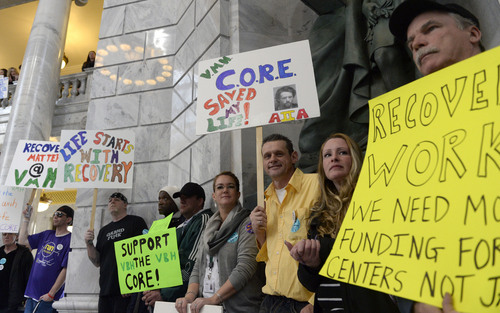This is an archived article that was published on sltrib.com in 2014, and information in the article may be outdated. It is provided only for personal research purposes and may not be reprinted.
The squeamishness Utah's Republican leaders feel toward helping poor people get health care has turned out to be — and why are we not surprised about this? — a good thing for insurance companies.
Gov. Gary Herbert dithered for months over whether Utah should expand Medicaid as provided under the Affordable Care Act and then belatedly decided to ask the federal government for a waiver so Utah could again favor corporations — in this case, insurance companies — over public health. Meanwhile, low-income Utahns were forced to sign up for medical insurance more expensive than Medicaid.
And, even worse, about 58,000 of the poorest residents of the conservative Beehive State remain without any kind of health coverage because they don't make enough money to qualify for a discounted health plan on exchanges set up on http://www.HealthCare.gov.
The health law excluded them from subsidies allowed for higher-paid people on the exchanges because, as originally passed by Congress, it provided for them to be covered by Medicaid. But a U.S. Supreme Court ruling made the Medicaid expansion optional for states, and Utah legislators are so blindly opposed to the President Obama and his programs they refuse to expand Medicaid in Utah.
Herbert, prevented by the Legislature from accepting the federal money that would pay all costs of the Medicaid expansion for three years and 90 percent thereafter, has devised a plan to use the tax dollars already paid by Utahns to the federal government to help poor Utahns get higher-priced insurance from private providers.
It seems of little concern to them that poor families must continue to get inconsistent medical care at emergency rooms or go without health care altogether simply because their ideology dictates they must block any initiative coming from a Democrat in the White House. Instead, their priority is protecting the bottom lines of insurers.
Herbert's plan has yet to be approved by the Department of Health and Human Services. While waiting, many uninsured low-income Utahns have taken the only option open to them, and signed up on the exchange for private insurance at a ratio of 8 going to healthcare.gov for every 1 who has signed up for Medicaid.
That's good news — for insurance companies. Exchange plans, even those with substantial discounts for low-income subscribers, are more expensive than Medicaid, which provides comprehensive coverage with no premiums and $3 to $5 copays.
And Utah's most vulnerable citizens, those with incomes under $11,670 a year for an individual, are still without affordable and consistent medical care.



